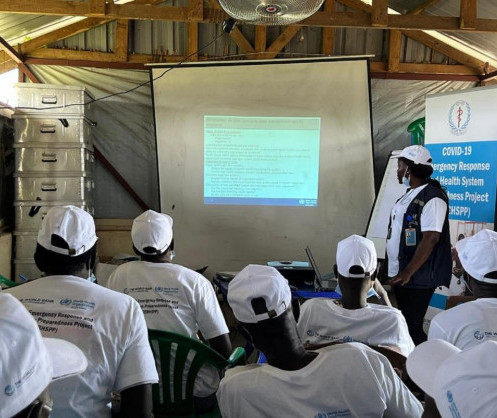South Sudan is experiencing multiple diseases outbreaks and floods, thus, increase the risk of transmission of infectious diseases and other health conditions such as severe malnutrition
JUBA, South Sudan, August 30, 2022/APO Group/ –Over 200 healthcare workers have been trained with the aim to improve real-time detection and prompt response to disease outbreaks and other health emergencies.
With support from the World Health Organization (WHO), the Ministry of Health have trained healthcare workers on the use of Early Warning, Alert and Response System (EWARS) in over 20 counties in South Sudan to optimize its use to support surveillance, alert management, outbreak response, and laboratory data and management.
EWARS is a web-based system and designed to improve disease outbreak detection in emergency settings.
In 2017 the EWARS project was rollout to all the 80 Counties of South Sudan with the second phase of the rollout further decentralizing data collection and alert management down to the health facility level from 2019 to early 2020.
Infectious diseases can cost lives and become difficult to control if they are not detected and responded timely
“With this training, I am able to identify and raise alerts in the system, verify alerts, investigate triggered alerts, and submit verification and/or investigation findings to the EWARS system successfully”, said Makuil Michael Magok Mayendit County Surveillance Officer, Unity State.
South Sudan is experiencing multiple diseases outbreaks and floods, thus, increase the risk of transmission of infectious diseases and other health conditions such as severe malnutrition.
Dr John Rumunu, Director General for Preventive Health Services at the Ministry of Health said, “given the current humanitarian setting in the country, an effective disease surveillance system is essential to detecting disease outbreaks quickly before they spread”.
“Infectious diseases can cost lives and become difficult to control if they are not detected and responded timely” said Dr Fabian Ndenzako, WHO Representative a.i. for South Sudan. “With generous World Bank funding, we are strengthening EWARS reporting by training healthcare workers countrywide”.
Before the rollout of EWARS in the South Sudan, the integrated disease surveillance and response (IDSR) weekly reporting rates were as low as 30%, far below the target of 80%. Following the completion of the EWARS rollout to the health facilities, the reporting rates improved and surpassed the target of 80% on completeness and timeliness of weekly IDSR reporting.
The Ministry of Health, WHO and partners continue to strengthen disease surveillance and response to attain the International Health Regulations of (2005) core capacity requirements for surveillance and response.







OTHER ARTICLES
Editorial — Prevent, inform, and act for women’s health in Africa
Kenya : Government Prioritises Maternal Health and Strengthens Support for Community Health Promoters
Strengthening pandemic prevention, preparedness, and response capacities in Senegal using the “One Health” approach